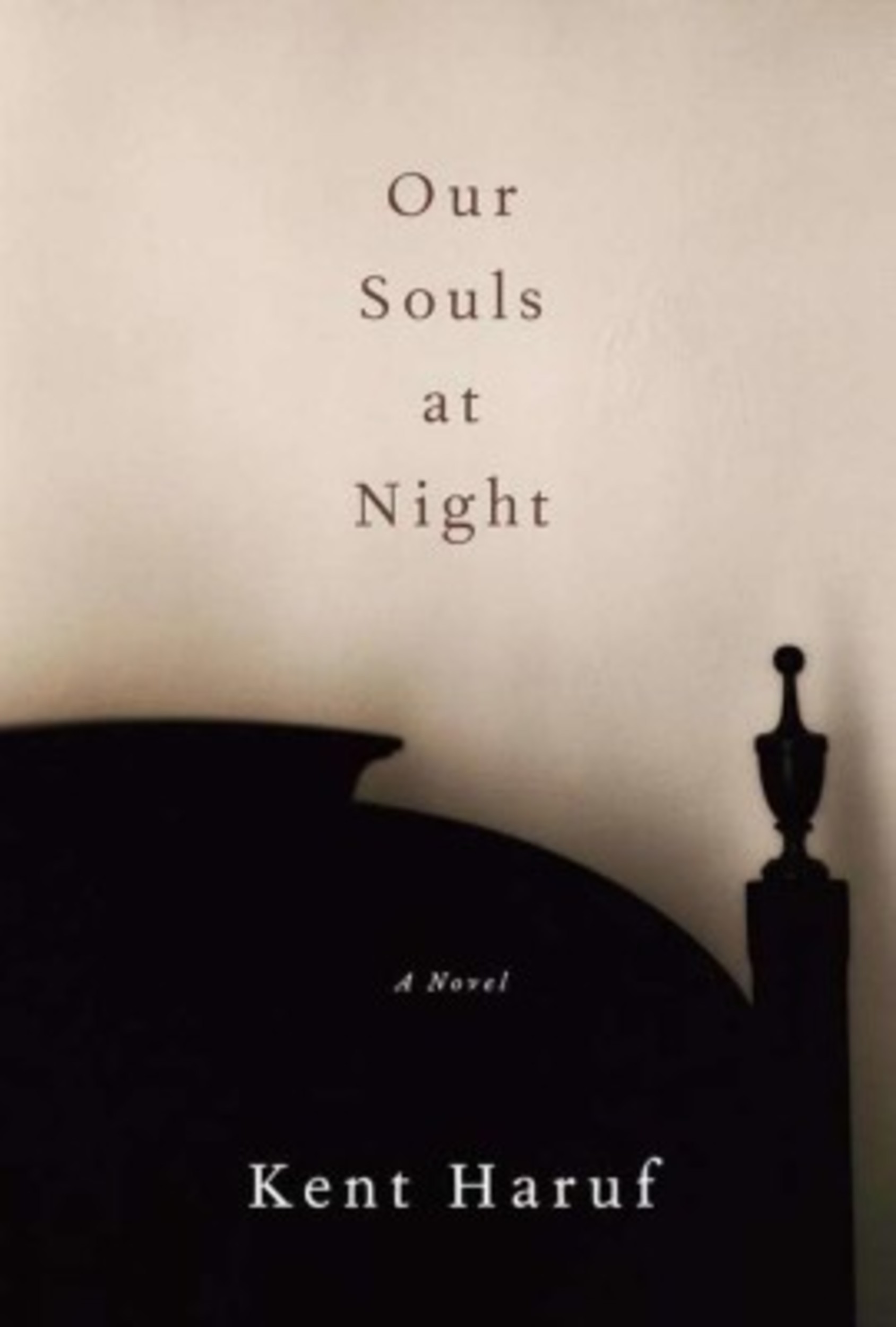Three works by award-winning novelists
"Our Souls at Night"
by Kent Haruf
Short, simple, and sweet—but, oh, so very sweet! Such is Kent Haruf's final book, "Our Souls at Night." The recipient of so many awards, including the National Book Award, the Whiting Foundation …
This item is available in full to subscribers.
Please log in to continue |
Register to post eventsIf you'd like to post an event to our calendar, you can create a free account by clicking here. Note that free accounts do not have access to our subscriber-only content. |
Day pass subscribers
Are you a day pass subscriber who needs to log in? Click here to continue.
Three works by award-winning novelists
by Kent Haruf
Short, simple, and sweet—but, oh, so very sweet! Such is Kent Haruf's final book, "Our Souls at Night." The recipient of so many awards, including the National Book Award, the Whiting Foundation Writers' Award, and the Wallace Stegner Award, to name only a few, Haruf passed away in November 2014.
I love his direct, concise yet eloquent style. Using the give and take of dialogue, he is able to convey in his unique manner intense depth of feeling: regret, sorrow, yearning. There is a sparseness in his writing; nothing is superfluous, somewhat like Hemingway. But despite the scarcity of sophisticated words and language, his simply-constructed sentences succeed in telling his narrative with humanity and emotional power.
One of the main characters here is Addie Moore, a lonely widow who craves companionship and human connection, who out of this need reaches out to Louis Waters, a neighbor widower. She is neither coy nor ambiguous when she knocks on his door suddenly one night with a proposition. If he is agreeable, she will welcome him into her bed each night for talk and friendly conversation. Although surprised, he too is lonely and agrees to her suggestion. And so during the dark hours, they discuss their childhood, former spouses, their marital relationships, their children, their unfulfilled dreams in the most forthright and honest manner.
Both find comfort and solace in this new-found arrangement, until Addie's adult son becomes aware of it and threatens to limit her time with her grandson, who has been staying with her while his parents are separated. He does not realize that the boy has formed a very close bond with Louis, who has been a healthy influence and comforting presence to the bewildered child, and a close confidant to Addie as well. This is tragic because this narrow-minded, mean-spirited son creates an awkward wedge which thwarts the couple's poignant camaraderie.
I have been a fan of Haruf since reading his earlier novel "Plainsong," which is characterized by the same spare style and quiet focus on exploring our shared humanity. In "Plainsong" two elderly bachelor brothers—rural farmers—take in a pregnant girl with nowhere else to go. I recommend both books highly.
by Anne Tyler
For "A Spool of Blue Thread," which Pulitzer Prize-winning novelist Anne Tyler has declared her last novel, she has chosen three generations of the Whitshank family as her cast of characters and their family homestead as her setting. The house itself, the one fixture in all of the characters' lives, plays a prominent part in this story, almost becoming a character itself.
Originally built by the grandfather, Junior, in the 1920's, the home has now passed down to his son Redcliff and wife Abbey, who like Junior and his wife Linnie Mae, have raised their family in it. Now all four of Red and Abbey's grown children have returned, since both parents are showing their age. It soon becomes apparent that jealousy and resentment have always existed between the two sons: Denny, who is Red and Abbey's biological child, and Stem, who was adopted.
Denny is angry that Stem has taken it upon himself to move into the Whitshank home to supervise the forgetful and ailing parents, but to Stem it seems only natural that he should assume the responsibility since he has worked all his life by Red's side in the family construction business. Denny, on the other hand, has been a drifter without a permanent home, address, or job; rarely in contact with anyone.
After Abbey dies, Stem learns that she has kept secret the identity of his real mother all these years. He is angry, shocked, and ashamed because she was not a woman respected by the Whitshank family. He also learns that Abbey, a former social worker, compelled his mother to sign a contract giving up all claims to him. Denny, on the other hand, is struggling with his own feelings of inadequacy and lack of acceptance, since his father always seemed to favor Stem for his maturity, responsibility, work ethic and superb craftsmanship in the family business.
This is a tale of family, the relationships between brothers and sisters, the hurts and failures of the various members, and the carefully crafted and guarded image parents sometimes try to create. It is also about letting go, particularly of a home which has symbolized so much to the various generations. Originally it was treasured by the grandfather for the stability and prestige it afforded him after so many years of toil, a tangible sign that he had "made it." For Red and Abbey it represented the permanence and stability of their love. Early in their relationship she had said, "Red, I want to learn every step of you, and dance till the end of the night." And for their children and grandchildren, it was a place to come home to, a haven, a refuge.
Since the place each of us calls "home" is such an essential and formative part of our lives, this story is likely to resonate with many readers.
by Anne Enright
A book about family dynamics, "The Green Road" focuses on the dysfunctional Madigans—the mother Rosaleen and her four adult children who have left their home in western Ireland for other parts of the world. Dan, the gay son, has moved to New York where he meets many men, yet is always unable to connect emotionally in any meaningful way. His brother Emmett has been working as a missionary in Africa, while their sister Hanna has become an alcoholic. These siblings also have relationship issues. The only one who has remained close to home is another sister Constance, who married a local man and is raising a family.
Rosaleen summons them all home for a last Christmas in the family homestead which she has decided to sell. All these characters seem to be harboring their own degree of bitterness and resentment. Rosaleen feels her children blame her for not doing a better job as a parent since none of them has amounted to much in her eyes or that of the world. (There seems to be no ill will toward the father, who has died.)
All four recall their mother, when young, as a hypochondriac using her health as a tool to manipulate them when they disappointed or opposed her, withdrawing into her bedroom for days rather than facing unpleasantness. Now they don't believe that she really intends to sell their childhood home, since in the past she has never been able to act directly on anything. Her style is to skirt around issues, deny, hide, and procrastinate in an attempt to avoid confronting reality or dealing with what must be done. They find her irrelevant chatter about trivialities maddening, as does the reader, when so much of the anger and fury burning within all of them needs to be addressed in some constructive manner.
Instead, on this Christmas Day when they are finally all together physically but as emotionally apart as ever, Rosaleen runs from the house into the cold December weather and becomes lost. She too is angry that all have left her with seldom a letter, visit, or phone call, making her feel that she "doesn't exist, doesn't matter." When she fails to return, they search frantically for her and realize that although they do not like their mother, they do love her.
This newly released book has garnered a lot of attention, possibly because the author Anne Enright has won a number of awards: the Man Booker Prize for her novel "The Gathering", as well as the Andrew Carnegie Medal for Excellence for "The Forgotten Waltz." Despite the fact that she was named the inaugural Laureate for Irish Fiction in 2015, I do not feel this particular work is deserving of such honors. For one thing, the dialogue with its uncompleted thoughts leaves the reader hanging in the air. I suppose that is deliberate since much of real speech is sometimes left unfinished as the person drifts off into thought.
Moreover, there are sentences containing little of substance; for example, one goes on for lines listing all the various foods sitting on the holiday table. Its only purpose might be to emphasize how Rosaleen herself can only focus on trivial details and not real issues. For those readers who have an interest in abnormal psychology, this family might serve as an intriguing subject.
Donna DeLeo Bruno is a native Bristolian and a retired teacher of writing and literature. She now splits her time between Bristol and Ft. Lauderdale, Fla., where she gives book reviews at the local library as well as at book clubs and women's clubs.











